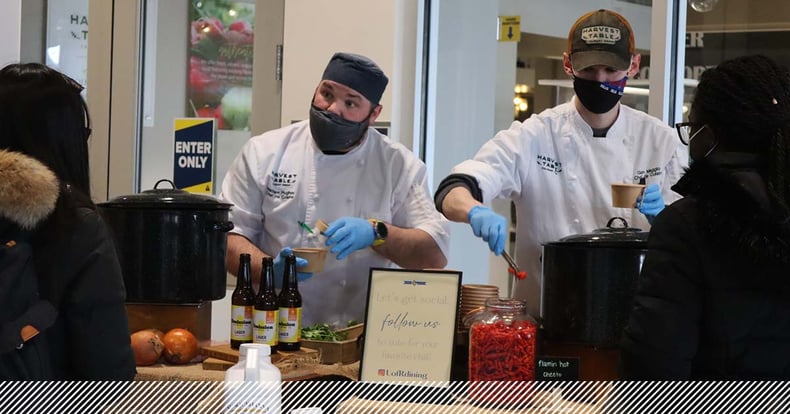
The University of Rochester in New York State has 14 dining locations operated by the contract management firm Harvest Table Culinary Group. The program has been run for 16 years by Senior Executive Chef Tony Pignagrande.
The university began tracking and preventing food waste with Leanpath in 2017, leading to a reduction in food waste of 46 percent, and helping the team achieve two corporate goals of conserving resources and reducing carbon emissions.
“There are savings, because we’re buying less food. And we’re shipping less food so that helps the environment. But ultimately, it says our operation is running effectively. It shows efficiency. It shows that the team’s engaged. It shows that our chefs are training proper knife skills and batch cooking. When the team is trained properly, the food is prepared the right way and the guests are satisfied. Preventing food waste encompasses all that.”
Prior to installing Leanpath, the culinary team tracked food waste on a spreadsheet. “So we had the data, but there was no follow through,” explains Chef Tony. “There was nothing else after that point.” That has changed with automated food waste tracking. “With Leanpath we can quantify food waste differently. We see patterns. We see comparisons day over day. We’re able to backtrack and see where the waste came from, have a conversation about it. It’s more actionable.”
Chef Tony continues, “We’ve made a habit to walk through all locations looking in bins and reestablishing the fundamentals to be successful. Our chefs teach the Leanpath system just like they teach any other part of daily practice in the kitchen, like cutting or sautéing. As a result [food waste prevention] has become a habit that teams hold each other accountable for.”
Chef Tony sets recurring food waste reduction goals in Leanpath’s Goal module focused on fruit and vegetable waste. “With the turnover of employees, it is extremely important for our chefs and managers to not take training for granted. We have made it part of our training and daily walk throughs to work with the teams on proper fabrication of all food products. For example, properly peeling melons and pineapples, using the whole cauliflower not discarding the stems.”
Hot foods like soups, pastas and grilled chicken were leading waste items due to overproduction. The kitchen donates when it can, but preventing that excess food from accumulating is the priority. “We always preach small-batch cooking, but seeing the numbers [from food waste tracking] builds that understanding about why it’s important to small batch cook.”
Sign up for our monthly newsletter in the footer below for the latest in
food waste prevention initiatives, best practices, webinars and more.
